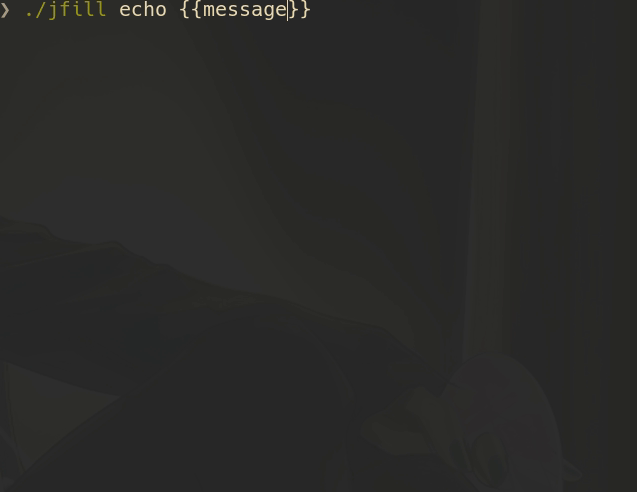Fill-in your command and execute it. Written in Pure Java 11 .
jfill stores the history of your commands in order to give you nice autocompletion
In order to trigger completion press TAB
In order to install it download the latest release.
It contains single executable. You don't need Java in your computer to run it.
If you want to execute it from any directory then put executable into /usr/local/bin (You need a root access)
In order to run it you have to have glibc version >=2.15.
In order to check your current version run this command ldd --version
Just pass arguments to jfill that you want to fill.
jfill echo {{message}}
Here is the gif

As you can see you can choose from the history pressing TAB.
When you finish jfill will execute the command for you
But the main power comes when you use tags. Why? Some times you need to connect to psql but use different credentials depending on machine you are connecting(Prod,Stage). In this case you could use tags
jfill psql -U {{psql:user}} -P {{psql:host}}
Let's say you have an endpoint /users that gives you a json of users and you have two servers.
In local environment this url will look like this localhost:8080/users while
in production server it will look like this www.prod.com/users.In this case you can
use tag to group both urls (let's say tag name is api)
Here is an example
As you can see jfill allows you to choose between two configurations (for local and stage environments)
jfill respects XDG standart. So your config
with previous commands will be stored in ~/.config/jfill/jfill.json file
If you execute jfill without params you will see help instruction
❯ ./jfill
NAME:
jfillin- fill your command and execute
VERSION:
2.0
AUTHOR:
[email protected]
To check version type
❯ ./jfill -v
jfillin 1.0
In order to build it you have to install graalvm native-image and Java 11 or above. To build it run
mvn clean package
It will create jfill executable in target folder . The size of this executable is 16MB(it's too big See This issue) In order to decrease it you can use upx it will decrease the size to 4 MB.
If you don't have a native-image in your machine then you can build a jar file using maven profiles
mvn package -P Jar
Here is the time output to see how native-image outperforms jar for cli apps
Jar
time java -jar jfill.jar -v
0.80s user 0.10s system 251% cpu 0.356 total
Native-image
time jfill -v
0.02s user 0.01s system 104% cpu 0.030 total
Add async testsRemove mockito- Add encryption


